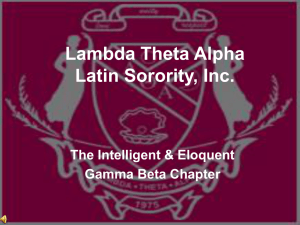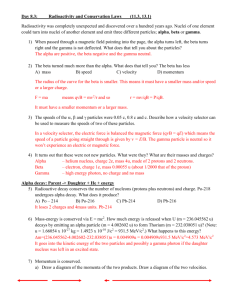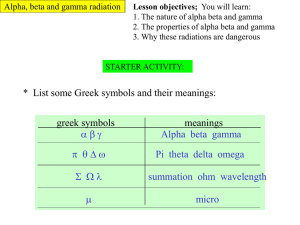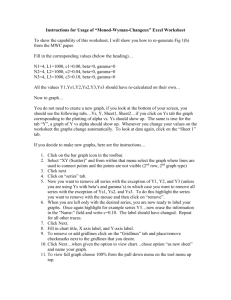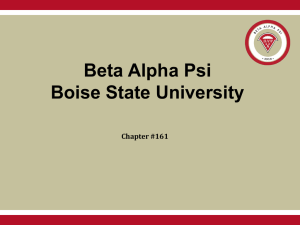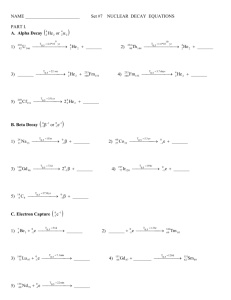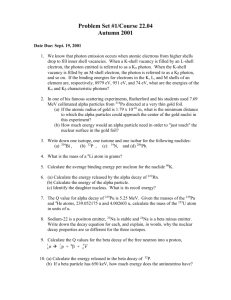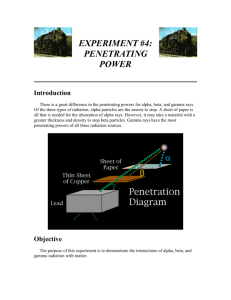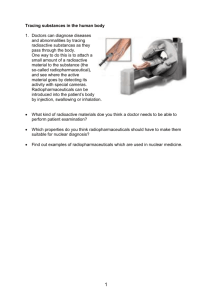Level 2 Physics (90256) 2010 Assessment Schedule
advertisement
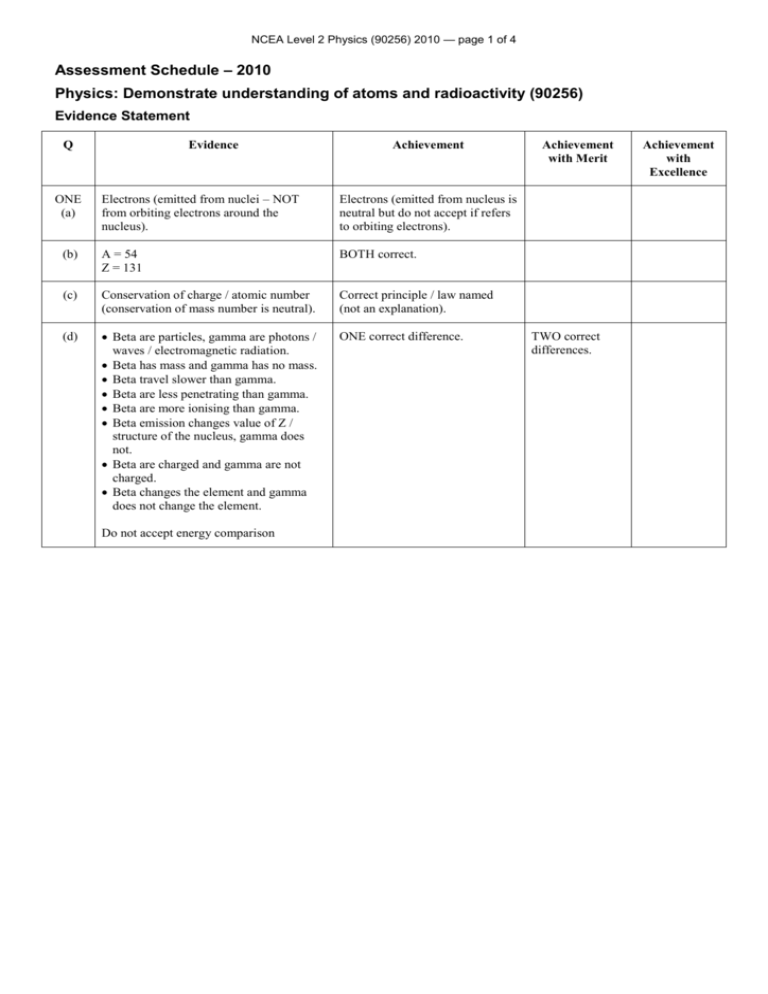
NCEA Level 2 Physics (90256) 2010 — page 1 of 4 Assessment Schedule – 2010 Physics: Demonstrate understanding of atoms and radioactivity (90256) Evidence Statement Q Evidence Achievement Electrons (emitted from nuclei – NOT from orbiting electrons around the nucleus). Electrons (emitted from nucleus is neutral but do not accept if refers to orbiting electrons). (b) A = 54 Z = 131 BOTH correct. (c) Conservation of charge / atomic number (conservation of mass number is neutral). Correct principle / law named (not an explanation). (d) Beta are particles, gamma are photons / waves / electromagnetic radiation. Beta has mass and gamma has no mass. Beta travel slower than gamma. Beta are less penetrating than gamma. Beta are more ionising than gamma. Beta emission changes value of Z / structure of the nucleus, gamma does not. Beta are charged and gamma are not charged. Beta changes the element and gamma does not change the element. ONE correct difference. ONE (a) Do not accept energy comparison Achievement with Merit TWO correct differences. Achievement with Excellence NCEA Level 2 Physics (90256) 2010 — page 2 of 4 (e) (f) The Technetium 99m has a 6 hr / short half- life, which means it won’t remain in the body very long therefore there is less chance of damage. The Technetium 99m has a 6 hr / short half-life, which means it will have a long enough half-life to remain active during diagnosis to make an image. The Technetium 99m has a 6 hr / short half-life, which means it will decay with enough intensity to make an image. The Technetium 99m has a 6 hr / short half life, which means it will decay quickly enough that after a short time / some time, eg after 24 hr it is almost harmless / all gone / will not remain active after use. Technetium 99m emits gamma rays that are very penetrating and so can pass through the body to the detector. Technetium 99m emits gamma rays that are not very ionising and so can pass through the body without causing damage. Technetium 99m decays to Technetium 99 that has a very long half-life so will produce very low levels of radiation / is non-harmful. Technetium 99m decays to Technetium 99 which then emits low energy beta particles that will not damage tissue. 24 hours is 4 half-lives. The Technetium 99m reduces to 0.75 mg (or 0.75 10–3 g or 7. 5 10–4 g or 0.0075). There is 12 – 0.75 = 11.25 mg (or 11.25 10-3 g or 1.125 10-2 g or 0.01125 or variants to 2 s.f., eg 1.1 10-2 g or 11 g) of Technetium 99. (Units are not required.) One concept explained using Physics. (Explanation links correct physics to the statement made) (An example of an insufficient link is “the Technetium 99m are not in the body very long therefore do not cause any harm” because there is no physics in this statement – needs to be a link to short half-life.) Correct answer for Technetium 99m. OR Correct subtraction method used to try and get Technetium 99 value is shown. OR Correct use of 4 half-lives leading to incorrect answer for Technetium 99m. TWO or more concepts explained using Physics. (Explanations link correct physics to the statements made.) Correct answer for Technetium 99. NCEA Level 2 Physics (90256) 2010 — page 3 of 4 TWO (a) Ionise describes the process where radiation knocks electrons out of atoms turning the atoms into (positive) ions. Ionising is where radiation removes / knocks electrons out of atoms. OR This causes atoms/air/air particles to become charged/become ions. (b) 1 Most of the alpha particles went straight through. Links to: atoms were mainly empty space. 2 Some of the alpha particles were deflected/deviated because the nucleus was positively charged and repelled the positively charged alpha particles. Links to: most of the matter was contained in a small, very dense, positively charged nucleus. 3 A few of the alpha particles were repelled straight back/at large angles because the mass of the atom was concentrated in the nucleus/the nucleus is very dense (not “large or heavy”). Links to: most of the matter was contained in a small, very dense, positively charged nucleus. THREE correct results/observations of Rutherford’s experiment. OR ONE correct linkage of result / observation with Rutherford’s conclusion. (Statements in italics are given in the question and do not add to the answers.) Ionising is where radiation removes / knocks electrons out of atoms. AND This causes atoms / air / air particles to become charged/become ions. THREE correct results / observations of Rutherford’s experiment AND ONE correct linkage of result / observation with Rutherford’s conclusion. OR (alternatively from above) TWO correct results / observations of Rutherford’s experiment AND TWO correct linkages of result / observation with Rutherford’s conclusions. (Statements in italics are given in the question and do not add to the answers.) THREE correct results / observations of Rutherford’s experiment AND THREE correct linkages of results / observations with Rutherford’s conclusions. (Statements in italics are given in the question and do not add to the answers.) NCEA Level 2 Physics (90256) 2010 — page 4 of 4 (c) X… alpha / α Y… gamma / γ Z… beta / β ALL correctly identified as: X is alpha because its direction changes because Fleming’s left hand rule (or other suitable hand rule) predicts this Alpha has much greater mass (8000 compared with beta) so it affected less by the force produced by the magnetic field. Alpha has a much smaller charge/mass ratio ( 1/4000 compared with beta) and so is affected less by the force produced by the magnetic field. X… alpha / α Y… gamma / γ Z… beta / β ALL correctly identified as: ALL correctly identified as: X… alpha / α Y… gamma / γ Z… beta / β X… alpha / α Y… gamma / γ Z… beta / β AND AND ONE correct reason. THREE correct reasons. OR ONE correct reason. Y is gamma because its direction does not change / it is unaffected because gamma rays have no charge/neutral (so are unaffected by a magnetic field). Do not accept are “unaffected by electric field”. Z is beta because its direction changes because Flemings left hand rule (or other suitable hand rule) predicts this. Beta has much smaller mass (1/8000 compared with alpha) so it affected more by the force produced by the magnetic field. Beta has a much larger charge/mass ratio ( 4000 compared with alpha) so it affected more by the force produced by the magnetic field. Note: A third reason may be stated as because two of the three types of radioactivity have already been identified so the remaining type must be the third type. Judgement Statement Achievement Achievement with Merit Achievement with Excellence 4A/M/E 3A/M/E+3M/E 3A/M/E+2M/E+2E
